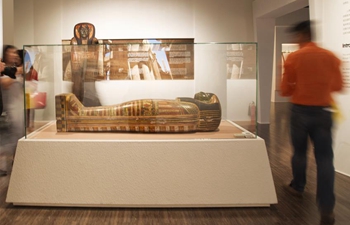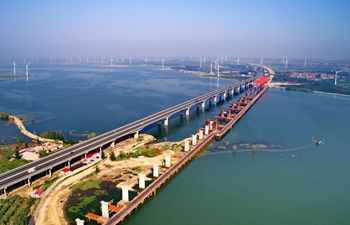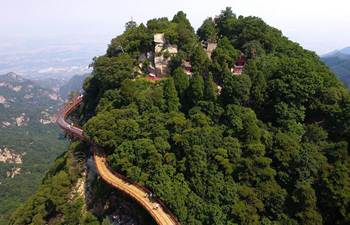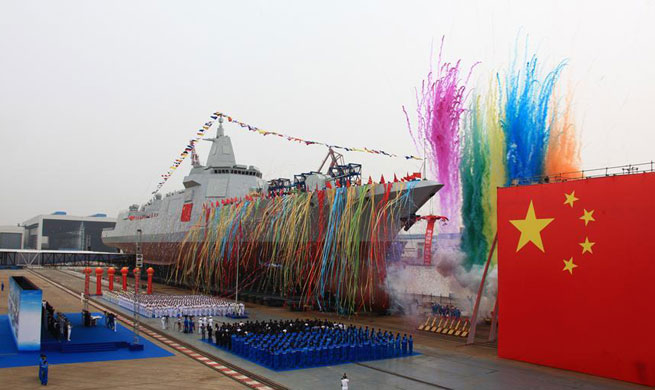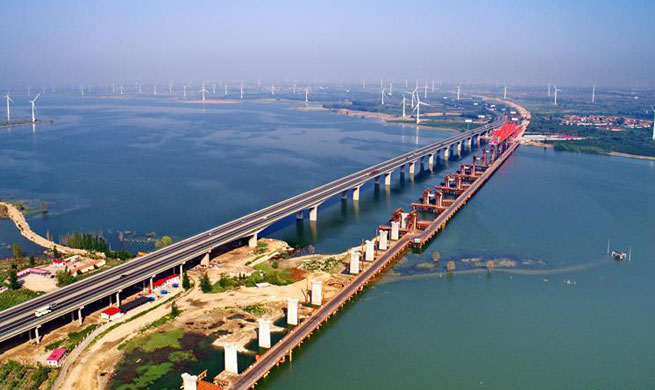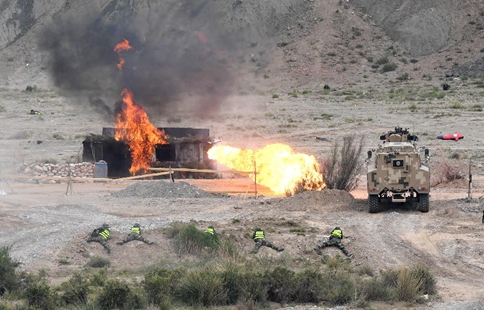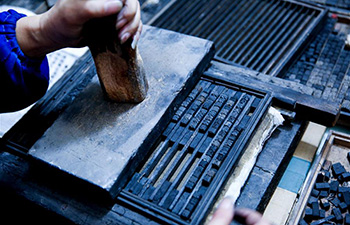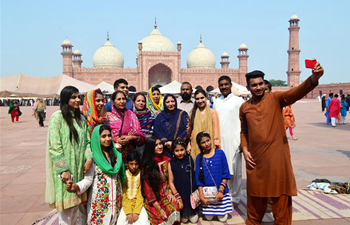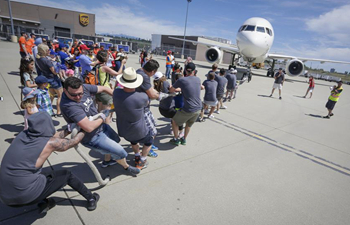By Hummam Sheikh Ali
DAMASCUS, June 28 (Xinhua) -- The United States has brought up the chemical weapons issue in Syria, by suggesting that the Syrian government forces are up to launch a chemical attack against rebels, warning retribution against the forces of President Bashar al-Assad.
White House press secretary Sean Spicer said that the United States had detected evidence of preparations for a chemical attack, similar to the preparations that occurred before an attack in April when the U.S. accused the government forces of carrying out a chemical attack against the Khan Sheikhoun town in Idlib.
At the time, the Syrian government denied the accusations and demanded a probe into the incident, accusing the rebels of staging the attack to draw in foreign retribution.
Government officials said then that the Syrian army was in a good position and making huge progress, and that there was no need to resort to such attacks.
They also completely denied any possession of such weapons.
However, no investigation was made and without waiting for any probe, the U.S. launched 59 Tomahawk missiles on the Shuairat airbase in central Syria, saying the chemical attack was prepared in that facility.
Then, analysts said the incident was reminiscent of what the United States did in 2003 when it invaded Iraq over unsubstantiated allegations of chemical weapons possession, which had later been proven wrong.
The strike in April was deemed as a message to the Syrian side that the U.S. is here and there will be red lines with retaliation if crossed.
Two months later, Washington started waving this wild card again, but why now?
The U.S. now has special forces in the Syrian desert, and the countryside of Aleppo, as well as in the Kurdish-controlled areas in northern Syria.
Washington is now throwing a big support behind the Kurdish-led Syrian Democratic Forces (SDF) to capture the city of Raqqa from the Islamic State (IS) group.
It's also supporting other rebel groups in southern Syria, in the desert, near the Iraqi borders.
Washington is also aiding rebel groups fighting near the Jordanian borders, with local reports speaking of military preparations on the Jordanian side of the borders.
The United States is now working to draw areas of its influence in Syria and doesn't want to be disrupted, but the advance made by the Russian-backed Syrian army is apparently raising the ire of Washington.
Since last month, the Syrian army captured thousands of square kilometers of territories in the sprawling Syrian desert from IS, reaching the Iraqi borders for the first time since 2014.
In the process of this progress and the aim to reach the Syrian-Iraqi borders, pro-government Syrian forces were struck twice by the U.S. on May 18 and June 6 near Tanf border crossing, where the U.S. and Britain have military bases.
Pan-Arab al-Mayadeen TV said in a recent report that timing of the Syrian operation to liberate the eastern desert from IS is to secure the supply route between Iran and Syria through the Iraqi territories and also to the Lebanese territories.
Such goal is what pushed the U.S. to strike the Syrian military convoy near Tanf, as the U.S. and its allies don't want any Iranian sway on the borders, particularly after the visit of Iraq's national security adviser, Faleh al-Fayad, to Syria on May 18, during which he discussed with President Bashar al-Assad ways to commence joint military operations between the Syrian and Iraqi military forces on the Iraqi-Syrian borders.
The Al-Mayadeen report said the U.S. desire to expand its sway in eastern Syria, mainly in Deir al-Zour province and the Syrian desert at the triangle between Syria, Iraq, and Jordan, is to prevent Iran and its allies from connecting in Syria and Lebanon.
So the main aim is to weaken the Shiite influence in Syria by trying to hinder any border connection between Syria, Iran through Iraq, and that's why the Syrian army and its allies of the Lebanese Hezbollah group and other Shiite fighters are fighting to thwart the American plan in Syria.
Abdul-Bari Atwan, a London-based journalist and editor in chief of the Rai Alyoum newspaper said in an article Tuesday that administration of U.S. President Donald Trump is uncomfortable with the big progress made by the Syrian army in the provinces of Aleppo, Homs, Hama, the countryside of Damascus as well as near the Iraqi borders.
"This is why they (Americans) want to explode the situation again in Syria because they don't want for this war to be over in any way," he said.
He added that the stage seems ready for another "chemical play" in Syria.
However, the Russian stance this time toward the U.S. threats feels stronger than that of last April.
Russian Foreign Minister Sergei Lavrov said on Wednesday that his country will respond with dignity and proportionately if the United States takes pre-emptive measures against Syrian government forces.
Lavrov said he hoped that the United States was not preparing to use its intelligence assessments about the Syrian government's intentions as a pretext to mount a "provocation" in Syria.
Russian Ministry of Foreign Affairs said in a statement Wednesday that Moscow perceives allegations made by the White House that Syria could be preparing a chemical attack as an "invitation" for terrorists to launch a provocation using chemical weapons.
"We consider these new insinuations on the issue of weapons of mass destruction, in the worst traditions of 2003 NATO intervention in Iraq, to be nothing less than an invitation for terrorists, extremists and armed opposition in Syria to fabricate another mass provocation using chemical weapons," the statement said.
Maher Ihsan, a Syrian political expert and a journalist, told Xinhua that the new move by the U.S. is a response to the Syrian army progress and a message that the Syrian army should abide by the U.S. rules.
He noted, however, that the general atmosphere in Syria doesn't give the sentiment that the Syrian side will be scared off that easy.
Following the strikes near Tanf, and the downing of the Syrian warplane near Raqqa earlier this week, the Syrian side continued to make progress on several fronts, and President Assad made a visit to the Russian-run base in Latakia to give a message of a strong alliance between Moscow and Damascus.
Ihsan pointed out that this time it will not be easy for the U.S. to carry out pre-emptive attacks on the Syrian army as that will put it into a possible direct confrontation with Russia.
He noted, however, that some rebels could stage an attack to inflame the situation, as warned by Russia, and in that way, the repercussions of such escalation will only complicate the prospects of solutions to the long-running conflict, because the U.S.-Russian tension will heighten and the language of weapons will be the most heard.




